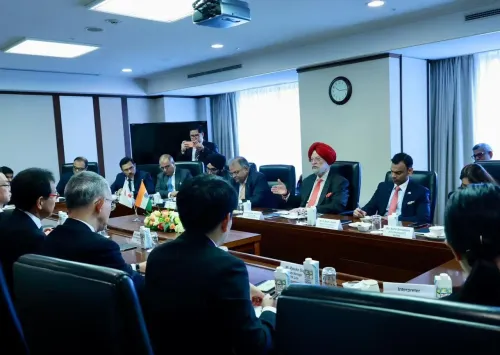Will Nifty and Sensex Recover from the New US Tariff Concerns?

Synopsis
Key Takeaways
- Domestic benchmark indices fell marginally due to tariff threats.
- Automobile, metal, and oil stocks faced weakness.
- Hero MotoCorp gained, while Kotak Mahindra Bank was among major losers.
- US markets ended positively, influenced by tech gains.
- Domestic consumption sectors show resilience amidst tariff concerns.
Mumbai, Aug 7 (NationPress) The domestic benchmark indices experienced a slight decline on Thursday, influenced by a downturn in automobile, metal, and oil stocks. The market was affected by the recent announcement regarding 50 per cent US tariffs on certain Indian goods, amidst mixed signals from global markets.
The Sensex dropped by 185 points, or 0.23 per cent, settling at 80,358, while Nifty fell 54 points, or 0.22 per cent, to reach 24,519.
Among the Nifty stocks, Hero MotoCorp topped the gainers' list with a rise of 1.27 per cent, followed by Cipla, Trent, Bajaj Finserv, and HDFC Bank. In contrast, Kotak Mahindra Bank, Tata Steel, Tata Motors, Jio Financial, and State Bank of India were among the major losers.
In sectoral indices, Nifty Metal fell by 0.54 per cent, while Nifty Auto decreased by 0.49 per cent. On the other hand, Nifty Pharma saw a gain of 0.64 per cent.
US President Donald Trump has imposed an additional 25 per cent tariffs on India, increasing the total tariffs to 50 per cent, effective from August 27. This escalation is based on accusations that India is “fuelling” Russia's war efforts through its imports of Russian crude oil.
“The 21-day period for the new 25 per cent tariffs to take effect provides an opportunity for negotiations and potential agreements with the US. Nonetheless, there remains significant uncertainty regarding trade policies and the willingness of both countries to compromise,” stated VK Vijayakumar, Chief Investment Strategist at Geojit Investments Ltd.
The market is expected to remain stable, yet weakness is likely to persist in the short term, particularly affecting export-oriented sectors.
“However, themes tied to domestic consumption, such as banking and financials, telecom, hotels, cement, and capital goods, are anticipated to remain strong,” Vijayakumar added.
Approximately half of India’s total exports to the US, which are valued at $80 billion, fall under the exemption list, encompassing pharmaceuticals and electronic goods.
In overnight trading, US markets closed positively, driven primarily by gains in technology stocks. The Nasdaq Composite surged by 1.21 per cent, while the Dow Jones rose by 0.18 per cent, and the S&P 500 increased by 0.73 per cent.
Asian markets exhibited mostly positive trends; Japan's Nikkei 225 climbed by 0.78 per cent, South Korea's Kospi rose by 0.46 per cent, and Hong Kong's Hang Seng Index inched up by 0.17 per cent. However, Chinese markets were down.
On Wednesday, foreign portfolio investors (FPIs) net sold Rs 4,999 crore worth of Indian equities, while domestic institutional investors (DIIs) net purchased Rs 6,794 crore worth of shares.
aar/na









